Thousands demonstrate for a humane asylum policy
Thousands demonstrate for a humane asylum policy
'Het Plein', the broad square next to the national parliament in The Hague, today provided the stage for a big and colourful demonstration for a humane asylum policy, beginning with a general amnesty for asylum seekers who have already lived in the Netherlands for several years. A total of forty-four buses came from across the country to swell the number of people gathered in front of the 'Tweede Kamer' building, which houses the country's main legislative chamber. A crowd of at least five thousand heard contributions from well-known artists, media personalities and politicians as well as the refugees themselves.
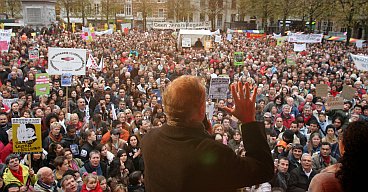
Dutch film star Katja Schuurman presided over an afternoon during which long-standing asylum seekers told how they had waited years for residency permits. They were joined by Dutch sympathisers who included writer, Catholic priest and SP parliamentary candidate Huub Oosterhuis, SP Senator Anja Meulenbelt, former PvdA (Labour) MEP and Senator Hedy D'Ancona, journalist Hanneke Groenteman, actor and entertainer Joris Linssen and television personality and media entrepreneur Harry de Winter.
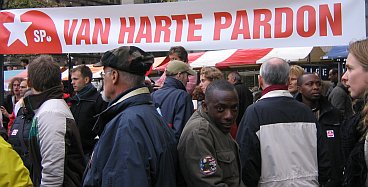
The demonstration was not the first of its kind. Since the beginning of 2005, when Minister for Immigration and Integration Rita Verdonk presented her policy on expulsions, demonstrations great and small have been organised throughout the country. What was different about today's event was the definite air of expectation which accompanied it. With the elections in prospect vague slogans have been replaced by a strong feeling that a new chance is in the offing to bring to an end years of misery for thousands of asylum seekers.
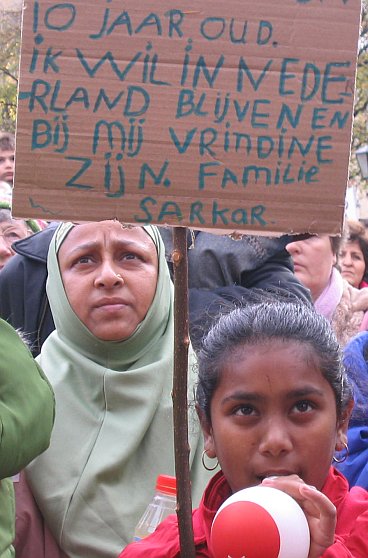
"Ten years old. I want to stay in the Netherlands with my friends"
Not for the first time demonstrators heard distressing examples of people who had waited for years and years in centres for asylum seekers, people who, as a result of administrative error, had been violently dragged from their beds and placed in a cell, and families torn from each other's arms. Outrage that such things could occur in the Netherlands poured from the podium.
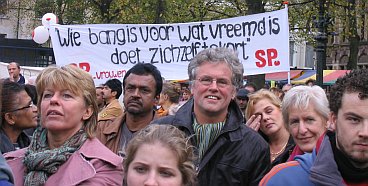
"He who fears difference harms himself."
SP Member of Parliament and home affairs spokesman Jan de Wit called on everyone present to give serious thought to the effect their vote would have at the general election on 22nd November. These elections offered an opportunity for a fundamental change in asylum policy. A vote for the SP would be a vote for a general amnesty and a humane asylum policy. The thought that they would have the chance in the near future to use their vote to change things appeared well-received, giving those present a greater feeling of optimism.
The government came under fire from numerous speakers because of the rapid and often careless procedures followed in the centres to which individuals must go to apply for asylum. “Completely innocent people are treated like trash, but that's probably less important to the Prime Minister than the loss of Lingo,” said Huub Oosterhuis, referring to Jan Peter Balkenende's protest against the ending of a popular TV game show of which he is a fan. More seriously, Oosterhuis suggested that the interests of holding together his coalition with the right-wing VVD weighed more heavily in the balance of Balkenende's thinking than did a humane asylum policy. He attacked the government's refrain of ‘regel is regel’ (rules are rules) which, he said, put him in mind of ‘bevel is bevel’ (orders are orders). Oosterhuis was followed by Harry de Winter, in his own words ‘a Jewish boy', who could confirm that 'rules are rules' and 'orders are orders' were suits cut from the same cloth.
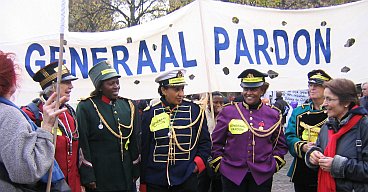
Bishop Van Luijn, representative of the ecumenical Council of Churches, told the crowd that we must all bear responsibility. “Humane and just treatment of asylum seekers, even those whose applications have been rejected, isn't something to be taken lightly, something with which you can agree or disagree. It is our moral duty.”
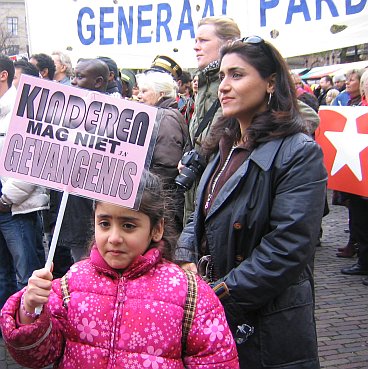
"Children should not be in prison"
Numerous demonstrators expressed anger over the fact that in their own country innocent children could still be locked away in detention centres. They wanted to be bring back a Netherlands of which they could be proud, as many put it.
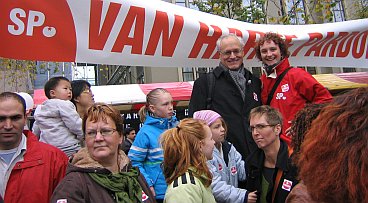
The demonstration, which was organised by a number of groups including Amnesty International, Defence for Children International, refugees' organisations and the Council of Churches, ended with music from a wide variety of artists representing the Netherlands' rich and diverse cultural mix.
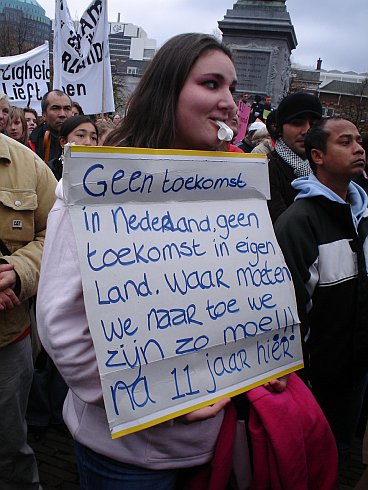
"No future in the Netherlands. No future in our own country. Where are we supposed to go after 11 years here? We are so weary"
